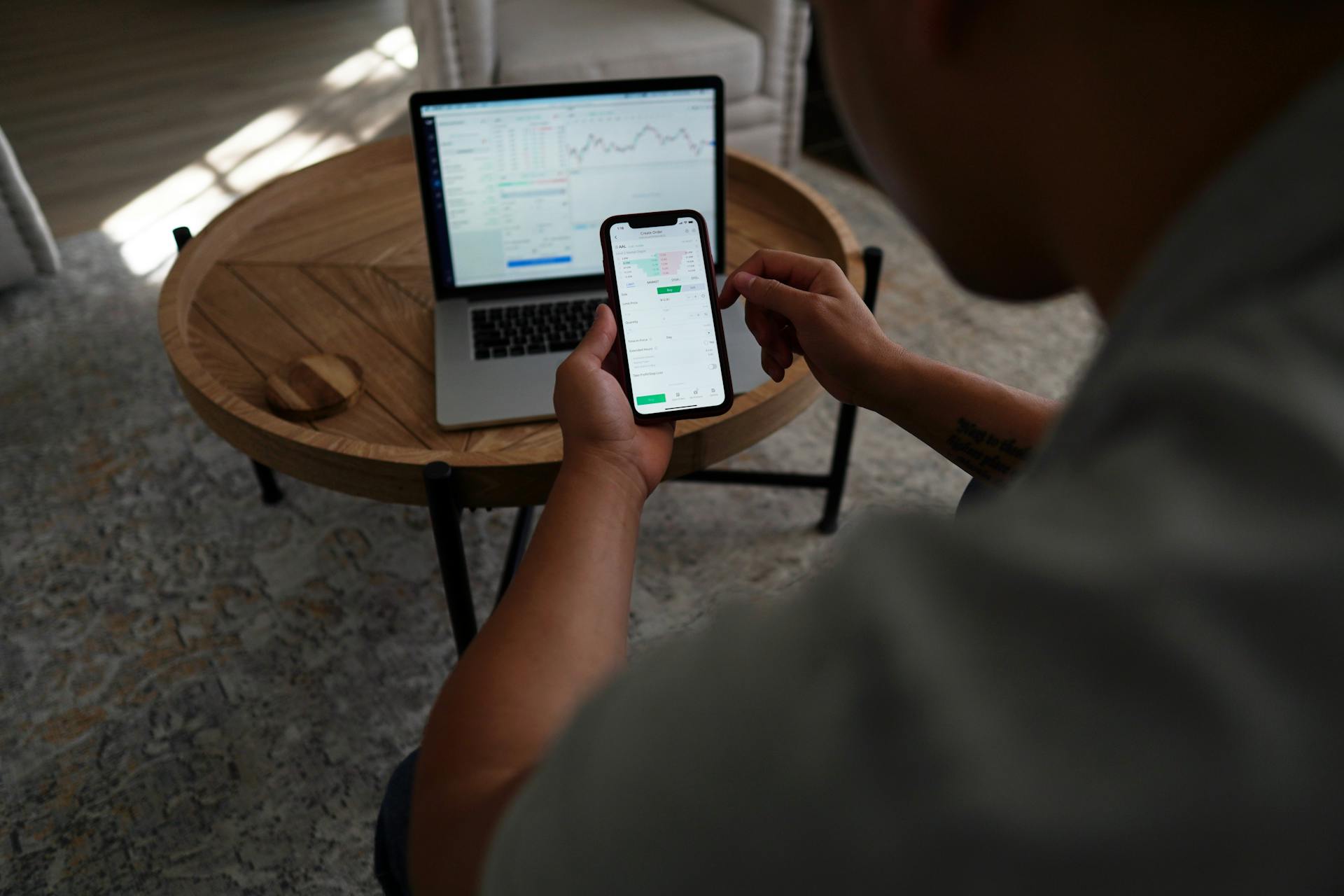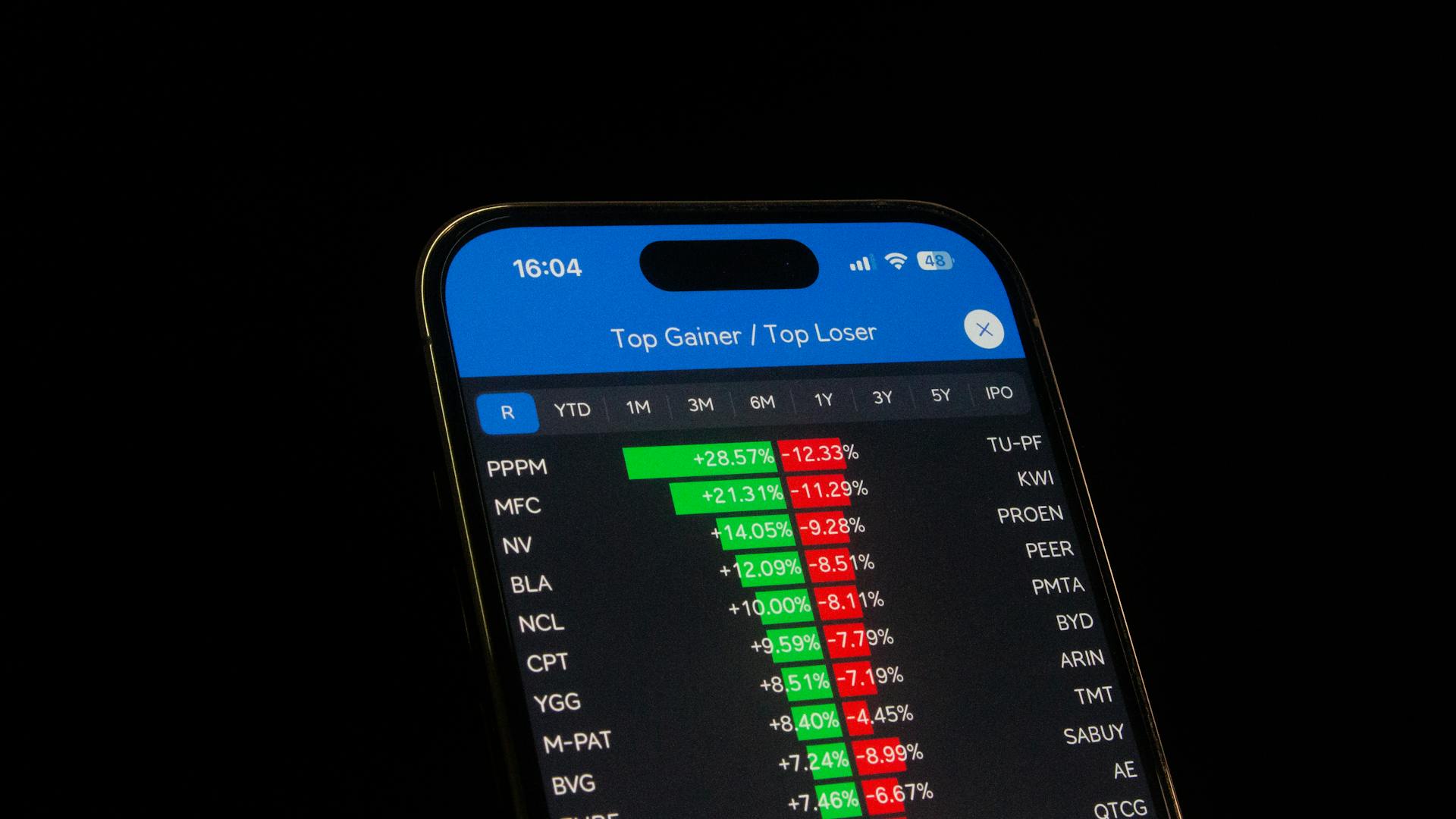
An online broker is a platform that allows you to buy and sell financial assets, such as stocks, bonds, and commodities, over the internet.
To open an online broker account, you typically need to provide personal and financial information, including your name, address, and Social Security number.
The account opening process usually takes a few minutes to an hour, depending on the broker's requirements and your level of documentation.
Once you've opened your account, you can fund it with money from your bank account or other sources, and start trading online.
Getting Started
You can typically open a brokerage account online in under 15 minutes. You'll need to choose a brokerage and consider factors like fees and services offered.
To get started, you'll need to collect some essential documents, including your Social Security Number, Taxpayer Identification Number, and proof of identity. You may also need to provide your employer's information and a W-9.
You can usually sign up for an account through the brokerage's online portal, and depending on the brokerage, you may even be able to start trading on the same day.
Key Benefits
Getting started with investing can be intimidating, but understanding the benefits of a brokerage account can make it more approachable. A key benefit of a brokerage account is that there are no contribution limits, so you can invest as much or as little as you want.
You can pull money out of a brokerage account at any time, which is a huge advantage over other investment accounts. This means you have more control over your finances and can access your money when you need it.
The investment selection available within a brokerage account is typically broader than you might find in other investment accounts. This means you have a wider range of options to choose from, which can help you create a diversified portfolio.
Here are some key benefits of a brokerage account at a glance:
- No contribution limits
- No restrictions on distributions
- Large investment selection
Where to Open
To open a brokerage account, you'll need to choose between an online broker and a robo-advisor. Both options are available.

Online brokers offer a range of services that allow you to manage your own investments. You can choose from various brokerage accounts with different fees and features.
Robo-advisors, on the other hand, provide access to help and guidance with your investments. This can be a good option if you're new to trading or want more support.
Ultimately, the type of brokerage account provider you choose will depend on your investment goals and preferences.
How to Open
Opening a brokerage account is a straightforward process that can be completed online in under 15 minutes. You'll need to add money to the account, similar to depositing funds into a bank account.
In most states, you must be 18 to open your account, but parents can set up a brokerage account for their kids. This is a great way to introduce them to investing early on.
To open a brokerage account, you'll typically need to collect a few things first, including your Social Security Number, Taxpayer Identification Number, and proof of identity. You may also need a W-9 and your employer's information.

Once you've gathered all the necessary documents, you can sign up for an account online through the brokerage's portal. Some brokerages may even allow you to start trading on the same day.
Here's a list of the documents you'll typically need to open a brokerage account:
- Social Security Number
- Taxpayer Identification Number
- Foreign tax ID, passport or visa number (if you're not a U.S. citizen or permanent resident)
- Proof of identity
- W-9
- Your employer's information
- Method of funding your account
After opening your account, you'll need to deposit or transfer funds before you can start investing. This usually involves linking your bank account with your brokerage account online.
Broker Types and Management
You can work with two types of brokers: self-managed and advisor-managed.
A self-managed account is a good option if you're confident in trading and willing to save on fees.
In contrast, an advisor-managed account is a better choice if you need guidance on which stocks to buy and sell.
Managed
A managed brokerage account offers investment management from a human investment advisor or a robo-advisor.
If you want to be hands-off about your investments, a robo-advisor might be a good fit, providing a low-cost alternative to hiring a human investment manager.
Recommended read: What Is an Investment Broker

These companies use computer programs to choose and manage your investments based on your goals and timeline.
You'll pay more in fees if you opt for an advisor-managed account, but it may pay off if you have a great advisor.
A self-managed account is worth considering if you're confident in trading and want to save on fees.
Robo-advisors can help you manage your investments without the need for extensive trading knowledge.
You'll still have to pay fees, but they'll be lower compared to hiring a human investment manager.
You might like: Broker Online Forex
What Does a Broker Do?
A stockbroker acts as a middleman between you and the stock market, executing trades with market exchanges like the New York Stock Exchange or the Nasdaq.
To do this, they must be licensed and registered with the U.S. Securities and Exchange Commission.
Stockbrokers connect buyers and sellers, imposing rules and regulations, and tracking the demand for each stock, which influences its price.
They often provide advice on which stocks to buy and sell, but it's essential to remember that they should not be confused with financial planners, who offer more comprehensive guidance on your financial situation.
In essence, a stockbroker helps you navigate the complex world of stock trading, making it easier for you to buy and sell stocks.
Discover more: Do You Have to Have a Broker to Buy Stock
Pros and Cons of Trading Stocks
Trading stocks online has its advantages. You can save money on fees since online brokerages don't have the same overhead costs as brick-and-mortar brokerages.
Lower fees can add up over time. For example, if you're trading frequently, saving $10 per trade can make a big difference in your portfolio.
Instant trades are another perk of online trading. Trades happen in real-time, which can be a huge advantage when trading volatile stocks.
If you're new to trading, you might appreciate the educational resources provided by online brokerages. You can get news alerts, weekly roundups, and more in-depth trading guides without paying extra for a separate news subscription service.
However, if you value a personal relationship with your broker, online trading might not be the best choice.
You might like: Stock Broker Charges
Broker Fees and Requirements

Broker fees can be a significant factor in choosing an online broker. Many online platforms have low fees, but you'll need to do the math before you start trading, especially if you can't commit a lot of money to stock trading.
Consider annual fees, discounts for balances, and fees per share. Some online brokerages offer $0 minimums, while others may have higher account minimums but offer more perks.
Here are some key things to keep in mind when evaluating broker fees:
- Annual fees: These can range from $0 to $200 or more, depending on the brokerage.
- Discounts for balances: Some brokerages offer discounts for larger account balances.
- Fees per share: These can range from $1 to $10 or more, depending on the brokerage and the type of trade.
- Account minimums: Some brokerages require a minimum account balance to open an account.
Keep in mind that these are general estimates, and fees can vary widely depending on the brokerage and the specific services you use.
Commissions and Fees
Commissions and fees can eat into your returns, so it's essential to understand what you're paying. Many online platforms have low fees, but you need to do the math before trading, especially if you can't commit a lot of money to stock trading.
Annual fees, discounts for balances, and fees per share should be considered. Some brokerages offer low fees, but it's crucial to evaluate the costs. Interactive Brokers, Webull, and Fidelity are examples of brokerages with low fees.
Worth a look: Currency Trading Online
Before opening a brokerage account, consider your investment goals and how frequently you plan to make trades. If you're a beginner, you may want to opt for an online broker with low fees and educational resources.
Some brokerages charge a fee for account inactivity, so it's essential to check the terms. If you plan to make lots of trades, look for a broker with a low fee per trade. Your level of trading experience and guidance needs should also be considered when choosing a broker.
Here are some things to keep in mind when evaluating commissions and fees:
- Annual fees
- Discounts for balances
- Fees per share
- Fees for account inactivity
- Fees per trade
- Interest on uninvested cash
- Interest on margin accounts
- Selling browsing data
Keep in mind that some brokerages may make money by earning interest on your uninvested cash or selling your browsing data. Make sure to read the fine print and understand how your broker makes money.
Retirement Differences
Retirement accounts can be either traditional or Roth, with the main difference being how taxes work. In traditional accounts, you pay taxes on the withdrawals in retirement, but contributions are tax-deductible.
Suggestion: Taxes on Online Business
The annual contribution limits for traditional and Roth IRAs are the same, $6,000 in 2022, with an additional $1,000 catch-up contribution allowed for those 50 and older.
One key difference between traditional and Roth accounts is that Roth accounts don't require you to take required minimum distributions (RMDs) in retirement, giving you more flexibility.
Choosing a Broker
Choosing a broker is a crucial step in trading stocks online. Consider how much money you plan to invest, as most firms require a certain amount of money to open an account.
Different firms also offer different levels of help, account types, and other services. For example, some brokerages don't offer much in the way of research or broker-assisted trades, while others offer market analysis, articles on successful trading, and help from licensed brokers.
When evaluating a broker, think about your level of trading experience and how much guidance you need. Some online brokerages are geared towards beginners, offering educational resources and libraries of how-to content on their websites. Others are more geared towards experienced traders, offering advanced trading tools and analysis.
Choosing a Broker
To start trading stocks online, you'll need to choose a brokerage firm that suits your needs. Consider how much money you plan to invest, as most firms require a certain amount to open an account.
You'll also want to think about how frequently you plan to make trades. If you're a buy-and-hold investor, look for a brokerage that doesn't charge a fee for account inactivity. On the other hand, if you're an active trader, you'll want a lower fee per trade.
Some brokerages offer more guidance and research tools than others, so consider your level of trading experience and how much help you need. If you're new to investing, look for a brokerage that offers educational resources, such as libraries of how-to content on their website.
Ultimately, the right brokerage for you will depend on your individual needs and preferences. Be sure to research and compare different options before making a decision.
Here are some key things to consider when choosing a brokerage:
- Minimum investment requirements
- Fees for account inactivity
- Trading frequency and fees per trade
- Level of guidance and research tools offered
- Additional services, such as debit cards, mortgage loans, and other investments
By considering these factors, you can find a brokerage that meets your needs and helps you achieve your financial goals.
Top 3 Investment Brokers
Choosing a Broker can be a daunting task, especially for beginners. Three of the best investment brokers include Interactive Brokers, Charles Schwab and eToro.
Interactive Brokers is known for its low fees and extensive trading platform. Charles Schwab offers a wide range of investment products and services, including retirement accounts and financial planning tools.
eToro is a popular choice for cryptocurrency trading and social trading features.
You might enjoy: Brokers Bid
Understanding Broker Services
An online broker is a company or person licensed to execute trades with a stock exchange, and they generally must be registered with the U.S. Securities and Exchange Commission.
You can't just walk into a stock exchange and buy a stock, you need a broker to help you. They act as a middleman between you and the exchange.
A broker's main job is to execute trades, but some also provide advice on which stocks to buy and sell. However, they shouldn't be confused with financial planners, who offer more comprehensive guidance on your financial situation.
To choose a broker, you need to consider a few things. The amount of money you plan to invest is a big factor, as most firms require a certain amount to open an account.
If you're going to make a lot of trades, you'll want a broker with low fees per trade. On the other hand, if you're going to hold onto a stock for a long time, you'll want to avoid fees for account inactivity.
Some brokerages offer more guidance and research tools than others, so think about your level of trading experience and how much help you need. If you're a beginner, you may want a broker with more resources available.
Ultimately, the right broker for you will depend on your individual needs and preferences. Here are some key factors to consider:
- Minimum account balance
- Trading frequency
- Level of trading experience
- Desired services (e.g. debit cards, mortgage loans)
Make sure your broker has good security measures in place, such as automatic logouts and transmission encryption. You should also research the broker's reputation and check if they're registered with the SEC.
Trading and Taxes
Trading and taxes can be a complex topic, but the good news is that you don't have to pay taxes on the act of opening a brokerage account. However, investment income within a brokerage account is subject to capital gains taxes.
If you sell a stock for a profit, you'll likely have to pay capital gains tax. This can be a long-term capital gains tax, which is 0%, 15%, or 20% depending on your taxable income and filing status.
Here are some key things to keep in mind when it comes to trading and taxes:
- Short-term capital gains tax is usually your ordinary income tax rate and is often higher than the long-term capital gains rate.
- You can use losses to offset some of your gains and reduce your capital gains tax burden.
- You'll pay taxes on dividends, even if you choose to reinvest them.
- You only pay capital gains taxes when you've earned income on your investments.
Making Trades
You can sell securities that have increased in value to realize a gain and pay taxes on it.
The gain or loss on the sale of a security is calculated by subtracting its cost basis from its sale price.
The cost basis is the original price paid for the security, plus any fees or commissions.
For example, if you bought 100 shares of stock for $10 each, the total cost basis would be $1,000.
You can also offset gains from one security with losses from another to reduce your tax liability.
This is known as a wash sale, which occurs when you sell a security at a loss and buy a "substantially identical" security within 30 days.
Taxes
You'll have to pay capital gains tax if you sell a stock for a profit later, but there's a catch - you have to hold onto it for over a year to get the most favorable tax bracket.
The long-term capital gains tax rate is 0%, 15% or 20%, depending on your taxable income and filing status.
If you sell a stock within a year of buying it, you'll have to pay short-term capital gains tax, which is usually your ordinary income tax rate and is often higher than the long-term capital gains rate.
You can use losses to offset some of your gains and reduce your capital gains tax burden.
You'll have to pay taxes on dividends, even if you reinvest them, and your brokerage will send you a DIV-1099 tax form to include in your tax return.
Taxes are a signal that your investments are earning a return, so don't view them as a bad thing - view them as a sign of success.
Here are the key tax tips to keep in mind:
- Hold onto your investments for over a year to get the most favorable tax bracket.
- Sell stocks within a year of buying them will result in short-term capital gains tax.
- Use losses to offset gains and reduce tax burden.
- Paying taxes on dividends is unavoidable.
- Taxes are a sign of earning a return on your investments.
Frequently Asked Questions
Who is the largest online broker?
The largest online broker in the US is Charles Schwab, with over $10 trillion in assets under management. Discover why Charles Schwab stands out as a leader in the online brokerage industry.
Sources
- https://www.nerdwallet.com/article/investing/what-is-how-to-open-brokerage-account
- https://www.nerdwallet.com/article/investing/what-is-a-broker
- https://www.experian.com/blogs/ask-experian/what-is-stockbroker/
- https://www.benzinga.com/money/compare-online-brokers
- https://money.howstuffworks.com/personal-finance/online-banking/online-trading.htm
Featured Images: pexels.com

